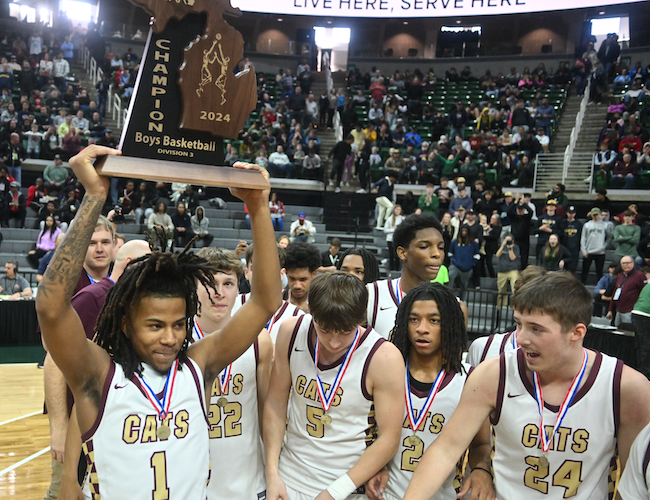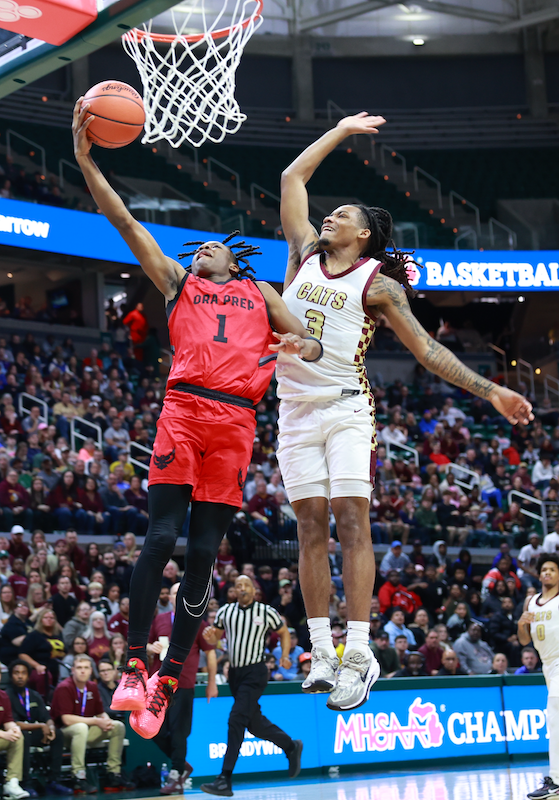
Detroit 'Longtime' Boys Coaches Down to Few
By
Tom Markowski
Special for Second Half
December 14, 2016
Gary Fralick considers himself one of the fortunate ones.
 Fralick, 66, is in his 32nd season as a head boys basketball coach. He retired from his teaching position in 2013. He started coaching at Redford Thurston in 1979, went to Royal Oak Kimball in 1984 and is in 23rd season as the head coach at Troy.
Fralick, 66, is in his 32nd season as a head boys basketball coach. He retired from his teaching position in 2013. He started coaching at Redford Thurston in 1979, went to Royal Oak Kimball in 1984 and is in 23rd season as the head coach at Troy.
Fralick might be lucky, but he is unquestionably rare. Fralick is believed to be one of three coaches in the Macomb/Oakland/Wayne area who has coached for more than 30 seasons.
There’s Dan Fife at Clarkston and Kevin Voss of Clinton Township Chippewa Valley, both of whom in their 35th seasons, all at the same school.
Another, Greg Esler at Warren DeLaSalle, is in his 30th season. He was the head coach at St. Clair Shores Lake Shore for seven seasons before going to DeLaSalle in 1994.
“We’re part of a dying breed,” Voss said.
It certainly appears so. Coaching longevity has taken on a different meaning recently. Twenty seems like a lot in these times, and in reality it is a long time. Twenty years or so ago, 20 years was normal. There’s a new normal, and 20 or 25 years isn’t it.
Many factors have contributed to this change. A person’s personal and family life often don’t coincide with the demands of coaching basketball. The responsibilities that come with coaching have increased. Some coaches say that to be an effective coach, it can be a 10- or 11-month job.
Two factors are at the forefront, and they are both financial. Coaches used to be educators as well as coaches. Yes, coaching can be viewed as teaching on the court, but at one time teaching in a classroom and coaching used to go hand in hand.
 Then there’s the subsidy coaches receive. It varies from school district to school district. Some make $4,000 a season, others can make $7,000. And it also costs money to run a program; unless the coach receives financial help from a booster club or parents, the money he or she receives begins to dwindle.
Then there’s the subsidy coaches receive. It varies from school district to school district. Some make $4,000 a season, others can make $7,000. And it also costs money to run a program; unless the coach receives financial help from a booster club or parents, the money he or she receives begins to dwindle.
But the most important factor is time.
“A tremendous amount of time is devoted to watching DVD or tapes,” Fralick said. “I know I’m dating myself with saying that. The point is, you’re watching a lot. There’s more scouting. And you don’t get paid much. Why don’t they stay as long as they used to? They get burned out. They want to spend more time with their families.
“You don’t see as many of the young coaches stay. Coaches don’t have the ambition to coach a long time. It’s not a profitable job. I don’t know what other coaches make. We used to compare what we made. Not anymore.
“Thirty years or more? I don’t see it happening. There’s the dual job thing. Things have changed. To me, it’s been a great job.”
To compensate for being away from home, Fralick brought his family with him. Sort of. He coached his son Gary, Jr., and Tim. Gary, a 1996 Troy graduate, played for his father his junior and senior seasons and Tim, a 1999 graduate, played four seasons on varsity. Fralick said he was even more fortunate to coach both on the same team (during the 1995-96 season).
Then there’s his wife, Sharon, who remains the scorekeeper.
“I’ve always had a passion for coaching and teaching,” Fralick said. “I love the game of basketball. I love the kids. There’s never a dull moment. It’s been a great ride.”
Vito Jordan has been around basketball all of his life. His father, Venias Jordan, was the boys head varsity coach at Detroit Mackenzie and Detroit Mumford before stepping down as a head coach only to return to the bench assisting his son the last six seasons.
Vito Jordan, 31, became a head coach at Detroit Osborn when he was 24. He started his coaching career the year before as an assistant to Henry Washington at Macomb College. Jordan went to Detroit Community after one season at Osborn and guided Community to its only MHSAA Finals appearance (Class B, 2013). He’s now in his fourth season as the head coach at Detroit Renaissance.
“I followed my father all of my life,” Jordan said. “I knew what I wanted to do when I was in college (Alma College). This is what I want to do the rest of my life.”
It’s different in Detroit. Schools close. Job titles change. Jordan, for instance, teaches at the Academy of Warren, a middle school in Detroit. It’s a charter school, not within the Detroit Public School system, therefore he receives his pay from two separate school systems (Renaissance is in the DPS).
There is a distinction. In some school systems coaches will receive a percentage – let’s say for argument sake, 10 percent – of their teaching salary to coach. Let’s say a person makes $60,000 a year to teach. He or she would then receive $6,000 to coach. If you coach two sports, that’s $12,000.
 Jordan is not privy to such a contract. Each job is separate. Jordan loves to coach, and he understands he must be a teacher to earn a decent living, and he’s content to continue on the path he is following. But he also knows that to make a good salary just coaching one must move on to the collegiate level like others have done.
Jordan is not privy to such a contract. Each job is separate. Jordan loves to coach, and he understands he must be a teacher to earn a decent living, and he’s content to continue on the path he is following. But he also knows that to make a good salary just coaching one must move on to the collegiate level like others have done.
“When there were coaches like my dad, Perry Watson (Detroit Southwestern), Johnny Goston (Detroit Pershing) and others, they all worked in the (Detroit Public) school system. Everyone was teaching. That was your career. None of them had aspirations of being a college coach. Not even Watson. Now everyone isn’t in the teaching profession. Maybe they do have a degree and maybe they don’t. The point is, most aren’t teachers. I can count on one hand those (in Detroit) who have their teaching certificate and coach.”
Jordan noted such successful PSL coaches like Derrick McDowell, Steve Hall and Robert Murphy who left high school to pursue a coaching career in college. Murphy guided Detroit Crockett to the Class B title in 2001 and is now the head coach at Eastern Michigan. McDowell has had two stints as a collegiate assistant coach, most recently at EMU. He’s since returned to coach at Detroit Western. Hall coached Detroit Rogers to three consecutive Class D titles (2003-05) before going to Duquesne University and Youngstown State as an assistant coach. Hall returned to Detroit last season and is in his second season as head coach at Detroit Cass Tech.
Jordan said they left high school to challenge themselves professionally, among other considerations. Voss said there are variables that influence how long a person lasts, in one school district or in coaching in general, that didn’t exist 20 years ago.
“Athletics have become pervasive in high school,” he said. “The whole booster situation you find in college is here. You can be winning but not winning enough. It’s a trickle down affect.
“Coaches complain about parents. Parents complain about playing time. High school sports is not as pure as it once was. Winning is way more important now. Now a coach comes in with a three-year window. You can have one or two down years, and the third you’d better win.
“Then there’s the pressure on your family. I’ve been lucky. My wife and I have had the players over for team dinners. We create a family atmosphere. It’s a change of society. I don’t envy the young coaches coming in.”
Community involvement has always been a priority for Voss. To keep a hand on the pulse, Voss heads the elementary basketball program within the Chippewa Valley school district. Games are held on Saturdays, and approximately 750 students take part.
“You have to have the right fit,” he said. “I’m in the right spot. You coach for different reasons when you get older. I’m enjoying the game. There’s a different level of satisfaction.”
 Tom Markowski is a columnist and directs website coverage for the State Champs! Sports Network. He previously covered primarily high school sports for the The Detroit News from 1984-2014, focusing on the Detroit area and contributing to statewide coverage of football and basketball. Contact him at [email protected] with story ideas for Oakland, Macomb and Wayne counties.
Tom Markowski is a columnist and directs website coverage for the State Champs! Sports Network. He previously covered primarily high school sports for the The Detroit News from 1984-2014, focusing on the Detroit area and contributing to statewide coverage of football and basketball. Contact him at [email protected] with story ideas for Oakland, Macomb and Wayne counties.
PHOTOS: (Top) Troy boys basketball coach Gary Fralick, left, is in his 32nd season coaching. (Middle) Detroit Renaissance boys coach Vito Jordan is following in the coaching footsteps of his father, Venias. (Below) Chippewa Valley boys coach Kevin Voss, left, is in his 35th season at his school. (Top and below photos courtesy of C&G Newspapers; middle photo courtesy of Detroit Public School League.)

Brandywine Seizes Momentum on Dunk, Rides Surge to 1st Championship Win
By
Steve Vedder
Special for MHSAA.com
March 16, 2024
EAST LANSING – It may be a stretch to believe a lone play early in a third quarter could decide a state championship game, but that's the best explanation Niles Brandywine could offer.
A steal and ensuing slam dunk ignited eight dominating minutes that earned the Bobcats their first MHSAA Finals title with Saturday's 56-48 win over Detroit Old Redford in Division 3 at the Breslin Center.
A steal and subsequent dunk by senior guard Jaremiah Palmer during the third period's opening seconds were what players credited with turning around a contest which saw Brandywine actually outscore Old Redford in just that one quarter.
"Jaremiah got the steal and the dunk, and we just kept it going after that," senior guard Byron Linley said. "We saw his intensity, and we wanted to match it."
 Prior to Palmer's steal and basket, Niles Brandywine had led only 4-1 midway through the first quarter and for less than three minutes of the second quarter, entering halftime down 24-23.
Prior to Palmer's steal and basket, Niles Brandywine had led only 4-1 midway through the first quarter and for less than three minutes of the second quarter, entering halftime down 24-23.
But Palmer's exploits kicked off a 20-5 third-quarter surge which led the Bobcats to as much as a 44-31 lead halfway through the period.
"Our goal was to come here and win and finish (the season) in a good way, and we did," Jaremiah Palmer said.
Senior guard Jamier Palmer said it wasn't the first time the Bobcats have rallied in the second half, and the steal and dunk were at least a key part of the championship win.
"I think so," he said. "We've been down before and fought our way back. Against Benton Harbor we were down like 20 points, and we still made that game ours."
Senior center Brock Dye said at halftime players talked about making a big play.
"We knew we had to change things, that we couldn't be one stop short," he said. "Then we got the dunk, and everything changed quickly. It energized us. We told ourselves, 'OK, we're here to play.'"
Brandywine coach Nate Knapp, whose team has won 51 games over the last two seasons, said while the steal and dunk played a part, he also credited defense. The team gave up an average of just 39 points over seven tournament wins. Old Redford (21-8) shot just 38 percent from the floor while missing 16 of 18 3-point attempts.
"We have five guys on the floor and one heartbeat," Knapp said. "We take things one step at a time. That's what we preach, and that's what the kids buy into."
 Jaremiah Palmer finished with18 points, six rebounds and three steals while Ja'Torian Smith had seven points and 10 rebounds.
Jaremiah Palmer finished with18 points, six rebounds and three steals while Ja'Torian Smith had seven points and 10 rebounds.
Sophomore Jaylin Muldrow had 14 points and Ja'Quan Stennis added 10 for Old Redford. The Ravens started only one senior in forward Justin Adams, while underclassmen scored all 48 points.
Old Redford coach Ray Reeves said the team settled for jump shots instead of getting the ball inside, and also set far too many picks on offense. Brandywine held a 36-27 advantage on the boards, with 13 offensive rebounds.
"They were more aggressive than us, and I think experience came into play," he said. "We've been outrebounding teams, and tonight they killed us. There are no excuses, we just didn't rebound or get to the line. They dominated both.
"From the middle of the first quarter on, they attacked the boards and got the ball down the floor. They did the things that got us here."
Knapp said defense has been a strength all season.
"Defense wins big games; you've got to defend," he said. "We said tonight we've got to do one of our best jobs of stopping their penetration and help box out. We came out and imposed our will in the third quarter.”
PHOTOS (Top) Jaremiah Palmer slam dunks during Niles Brandywine’s Division 3 championship win Saturday at Breslin Center. (Middle) Jamier Palmer (1) raises the trophy surrounded by teammates. (Below) Old Redford’s Jaylin Muldrow (1) gets to the basket with Jaremiah Palmer defending. (Photos by Hockey Weekly Action Photos.)

